Homemade Bathtub Scrub (with a Surprising Secret Ingredient)
This post may contain affiliate links, including those from Amazon.com, which means we earn a small commission off your purchases. And here's the thing: We only mention services and products that we think are truly worth your attention, whether they're free, paid, or otherwise. This site relies on YOUR trust, so if we don't stand behind a product 110%, it's not mentioned. Period.
Let me admit straight-out: I am picky about my bathtub scrubs.
A weird thing to be picky about, perhaps, but scrubbing the bathtub is just one of those jobs that I find totally frustrating with the wrong tools and totally satisfying when I have the right ones.
Pumice stone is my favorite scrub – bar none – but it's not easy to source where I live. Bummer.
But when I read Mama Natural's tutorial last month on how to make homemade calcium supplement from eggshells (which I also use for toothpaste), my wheels started turning.
Wouldn't ground eggshells provide just the right abrasiveness for scrubbing bathtub scum?
I mixed up a test batch, and sure enough – just right. Score!
So, here's a simple recipe to reuse your eggshells (even the conventional ones from chicken who eat soy and who-knows-what-else) to make a super-cheap, super-effective soft scrub for all your kitchen and bathroom cleaning needs!
The baking soda is included for degreasing, the essential oils provide scent and antibacterial properties, and the calcium gives it the oomph it needs to really get the tub clean.
For use as a dietary supplement, you MUST sterilize the eggshells to kill all pathogens – that's why we boil the eggshells in this tutorial. As a bathtub scrub, this isn't as essential, but I still choose to do this step because as the scrub sits for several months, I want to squelch any opportunity for mold and bacteria to grow in the mixture. Cleaning the bathroom with bacteria-laden scrub just doesn't sound that appealing somehow…
Also, while the essential oils are optional in this recipe according to your preference, remember that many essential oils have strong antibacterial properties, so they play a useful role in this recipe as well as an olfactory one.
Homemade Bathtub Cleaner
3 dozen eggshells to make about 3/4 cup of calcium powder
1/2 cup baking soda
15-20 drops of your favorite pure essential oil – I recommend something citrus-y
Rinse the eggshells well with plain tap water.
Meanwhile, place 3-4 gallons of water in a large stockpot and bring to a boil. Reduce heat to a gentle simmer, then carefully lower the eggshells into the water and let them cook for 10-12 minutes.
Remove the shells carefully and set them upside down on a baking sheet. Let them air dry for 8-12 hours, then place them in a 200° degree oven until they are completely bone dry, about 10 minutes.
Working in batches, place the shells in a coffee grinder and process until they are completely powdered.
Toss the finished calcium powder with the baking soda and essential oils and mix until the oils are well-distributed and no clumps exist.
Spoon into a pint-sized Mason jar, then lay a piece of plastic wire mesh over the mouth. Screw on the regular lid to fit very tightly and store in a cool, dark place. To use, merely remove the lid and rescrew on the ring to create a shaker. (You could also use a sprouting lid or anything else that strikes your fancy!)
homemade bathtub scrub / homemade b
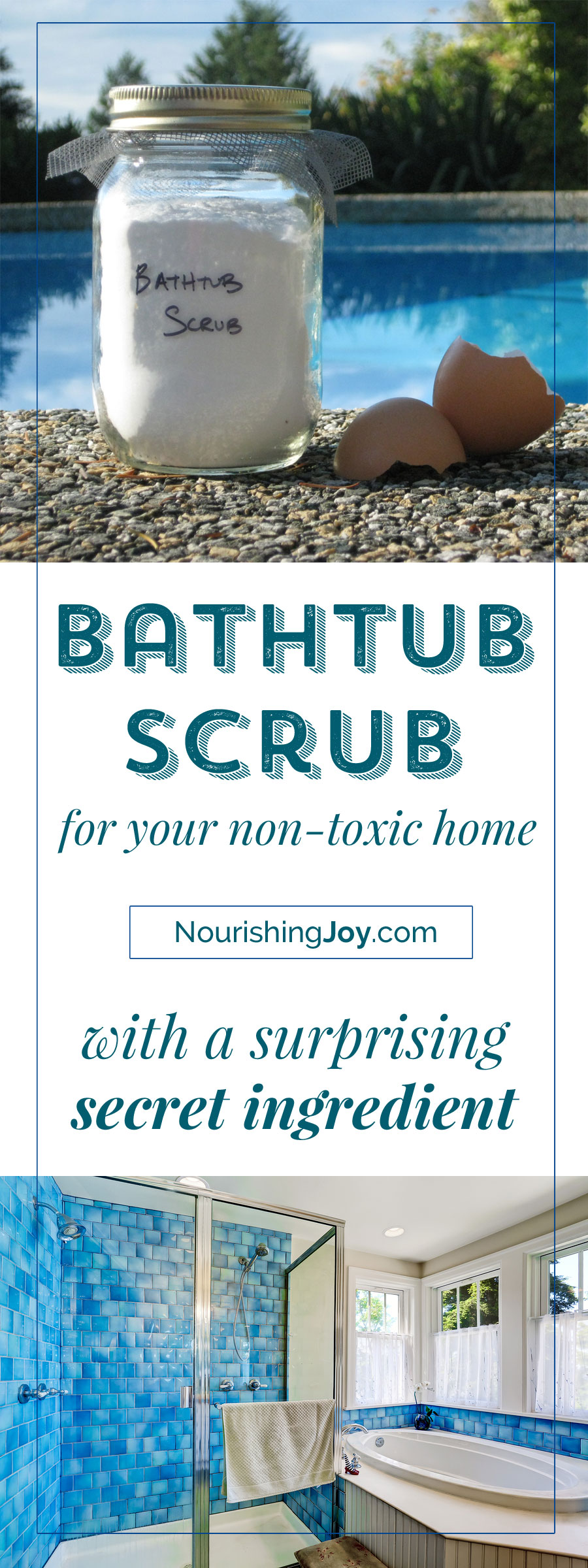


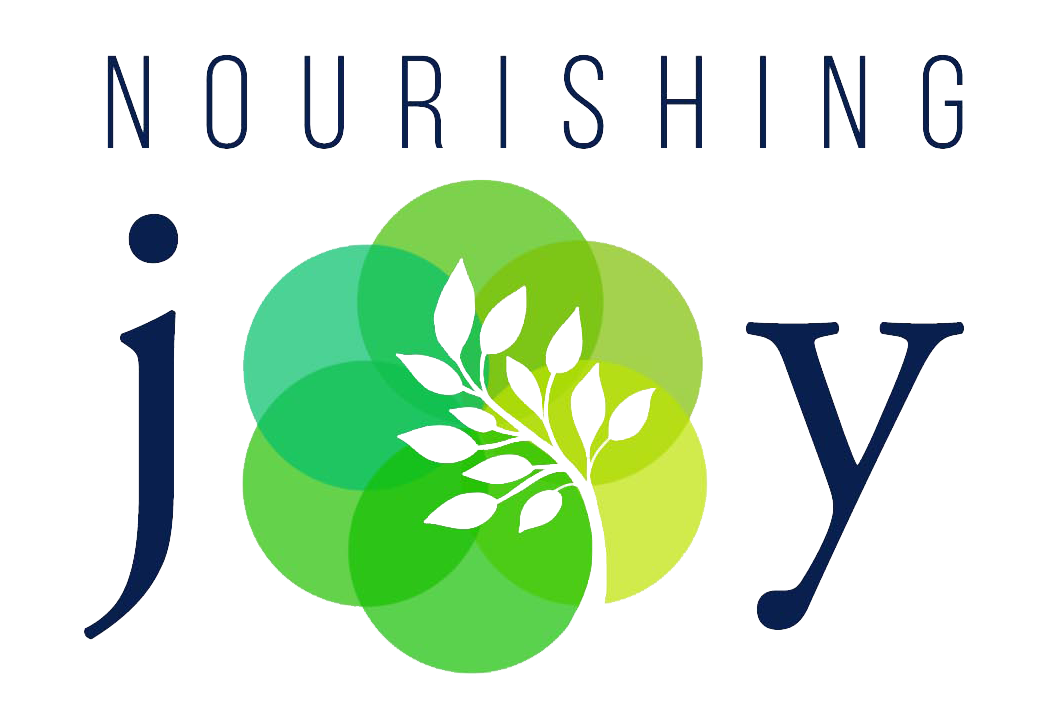
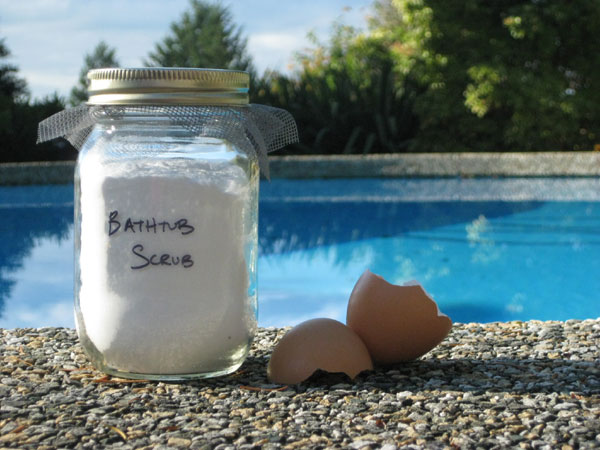

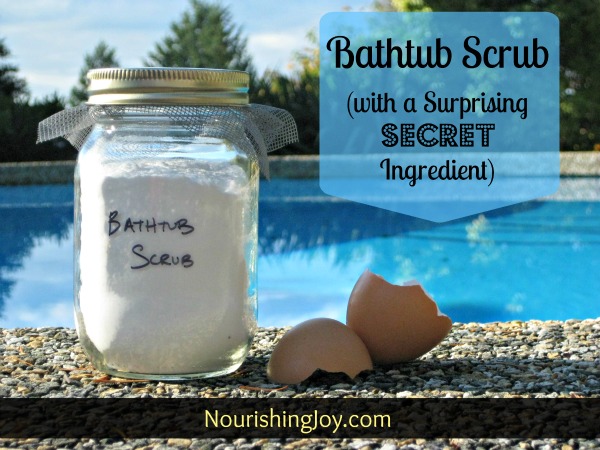
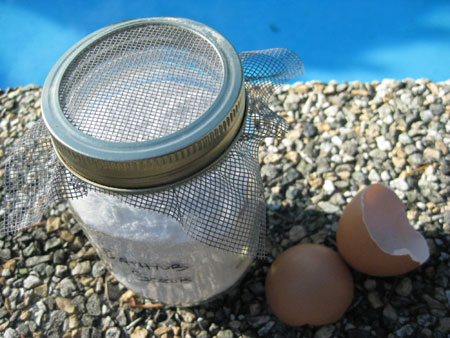


With all the pumpkin pancakes you’ve been making (all those eggs!) I can see why you were glad to find something very useful to do with the egg shells! 😉
Ha! Isn’t that the truth? 😉
Would the egg shells have a negative effect on the coffee grinder? I am terrified to touch it because it is my husband’s baby! Also, how long is it safe to stash egg shells for this? Might only take a week or two, but would that be ok to keep around for that long before getting enough together for this scrub recipe? Where do you stash yours while you are saving them up? This is a great idea! Would have never thought of using egg shells to make a bathroom scrub!
Hi, Jenn!
The eggshells shouldn’t have any more of an effect on a coffee grinder than the beans do (I sort of crush them up as I put them in), but I would recommend getting one from the thrift store specifically for “non-coffee” grinding, especially if your husband prizes his tremendously. I picked one up for $2 at my local Value Village, so it needn’t be a huge investment, and I use it for eggshells, spices, and powdering sugar.
My favorite way to collect the eggshells is to give them a quick rinse right after I’ve cracked them, then place them back in the egg carton in the refrigerator. You could keep them out at room temperature too, but I would try to keep all the shells separated so that any albumin residue would have a chance to dry. I go through about 2 dozen eggs a week, so we usually have enough quite quickly, so I can’t give much advice on long-term storage.
I hope that helps!
I’ve been keeping the shells in the freezer in a ziplock bag while waiting to have enough to do this. Finally going to try it today 🙂
What a great idea.
Thanks, Kresha!
Okay I found your blog because I grind up eggshells for my blossom end rot prone plants and my dog and myself and was cleaning my sink with soft scrub when I had an epiphany! Thanks for this recipe and don’t forget to save some eggshell powder for your calcium loving plants!!!!
Egg shells are also good for a natural calcuim suppliment.
Just grind the egg shells in a coffee grinder, let the powder set in lemon for 10 minutes and swallow with water.
1 tsp is 700mg of calcuim for free, I like free.
I’m glad you mentioned this, Denise. I have better results with eggshell calcium than I ever did with health food store supplements. The claim is that this form of calcium is more bio-available to our bodies. I’ve been using eggshells this way for quite some time and have seen a significant improvement in my nails, skin and hair. My fingernails used to split and break easily, now they rarely do. I use one tsp powdered egg shell with 1/8 tsp ascorbic acid and two tablespoons pureed lemon…wait till it froths up…and then add a bit of orange juice.Tastes great and it is so good for you.
make sure the eggs come straight from the chooks not shop brought. eggs are cleaned twice as a rule and usually using bleach. since the shell is porous probably not a good idea to be eating the shells unless from person you know or your own chooks. it does not matter if they are supposed to be organic they are cleaned using substances that you should not inject.
Im confused the link made it sound like a bidy scrub but this says bath tub scrub. Do i clean myself or he tub
This is for cleaning the tub (or your sink or your countertops…) 🙂
The top from a Parmesan cheese container fits a regular mason jar just right, and the shaker is very handy!
What a great idea! Thanks for passing it on.
You can also put holes in a lid of a mason jar, and cover that with another lid before screwing the ring on. When it’s time to use, remove the top lid, and sprinkle with the one underneath. Keeps the powder dryer for future use.
When you say bake at 200 degrees, is that Fahrenheit or Celcius?
That’s Fahrenheit – sorry for the confusion! 🙂
I bought a brush for cleaning bathtubs & showers because it is the worst cleaning job in the house with asll that bending or kneeling down. The brush is called Tub Scrub and the site is http://www.kronosenterprises.com Food for thought
Just curious — wouldn’t all the washing and cooking of the shells remove the calcium?
It might remove some of it – you’d have to look at the original study in MamaNatural’s article to find out exactly how much – but in the case of using them for a bathtub scrub, the calcium content doesn’t really matter.
You raise an excellent point however, and now I want to go find out how much leaching takes place! For example, I have a friend who tosses eggshells into her stockpot whenever she’s making stock in order to increase the calcium in the stock.
More like, an egg-cellent point…. 😉
This sounds great though, I will be trying this next weekend! 🙂
Is this safe for fiberglass tubs?
Linda
Absolutely. I’ve used it on fiberglass tubs, porcelain bowls, enameled tubs – and it scrubs without leaving a mark. 🙂
Just wondering why you boil the shells first. Why not just dry them out in the oven?
The oven doesn’t get hot enough to actually sterilize them, so the boiling is the best way to kill anything that’s left on the shells. 🙂 I WISH we could sterilize them in the oven – it would be SO much easier! 🙂
Dry sterilization (like in an oven) can be achieved in 60 minutes @ 340F. I brew my own beer and have never had an infection when I baked my bottles.
just got done doing this and was going to skip the boil part–boy am I glad I didn’t–also questioned the amount of water–the boiling is not for sterilization, it is to get rid of any last food particles!! once the shells start boiling- the water starts foaming like when you happen to boil a cracked egg–hence the 3-4 gallons–I use a strainer to skim the scum off and continue boiling–after 10 min. poured out most of the water and gave them a 2 min. cold water rinse, stirring as I went so that the little chunks could float to the top and just wash over the side– my shells are semi-crushed so now they are sitting in a strainer awaiting transfer to a baking sheet and a good bake in the toaster oven!!
you could also use the egg powder as in a pill and swallow for calcium support to your body
Hi Kresha!
My super friend, Joan Spanne, shared your website with me today, and I’m thrilled. I’ve been trying to go more natural with things, and my focus has been on cleaning products of late. Your site is a God-send!
Blessings!
Mary Lou,
I’m so glad! And I’m so glad to “meet” you. Any friend of Joan’s is a friend of mine. 😉
Is it safe for child ?
And can I use it for cleaning the floor ?
Well, it’s safe for a child to be around or even to use (if they’re the one doing the scrubbing), but I wouldn’t recommending eating it. 😉
And yes, absolutely you can use it to clean linoleum, vinyl, or tile floors, although I’d avoid wood, as it might scratch.
I hope that helps. 🙂
Oh no I’ve just accidentally skipped the boiling part & have already crushed the shells to make the powder (which looks ok). The shells were VERY clean (or so it seemed!). I washed them several times in hot water, sat in direct sun for a day then baked in oven for 15mins & cooled before grinding them up. Do you think they’ll be ok for the scrub?
I’d also recommend keeping them clean & separate whilst building up your shell stock, I had a really hard time separating a few of them. It also took me forever to peel off the papery lining of the shells when washing, I can see the advantage of boiling now! Wasn’t a good start, hopefully for my next batch I will be better prepared!
A wonderful idea thank you, can’t wait to use it on my bath 🙂
Yes, they should be fine for the scrub! Those steps are especially important when you’re going to eat the calcium. Even if you’re going to store the scrub long-term, it sounds like what you’ve done is more than fine!
And that’s a great tip to clean them as you go. Albumin is a a great glue. 🙂
Great recipe !! I can’t wait to try it out! I am definitely going to try it once I run out of the cleaner I currently have
Wow, this is awesome! I would try this one. Can I also use it on bathroom tiles and toilet bowl?
Yes, absolutely! You might want to try it on a hidden corner first, however, just to make sure it doesn’t scratch or mar the specific materials your tiles are made of… 🙂